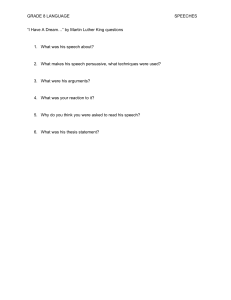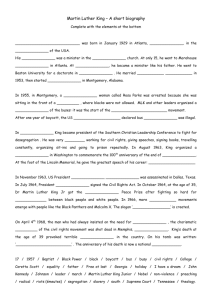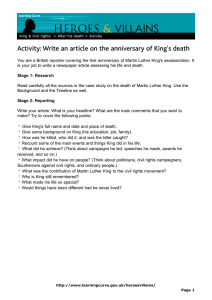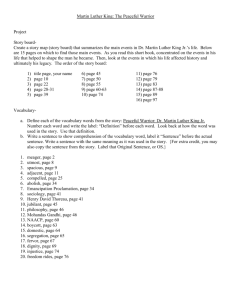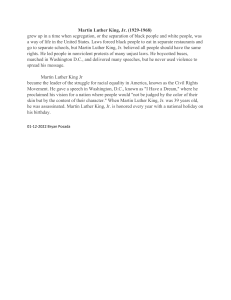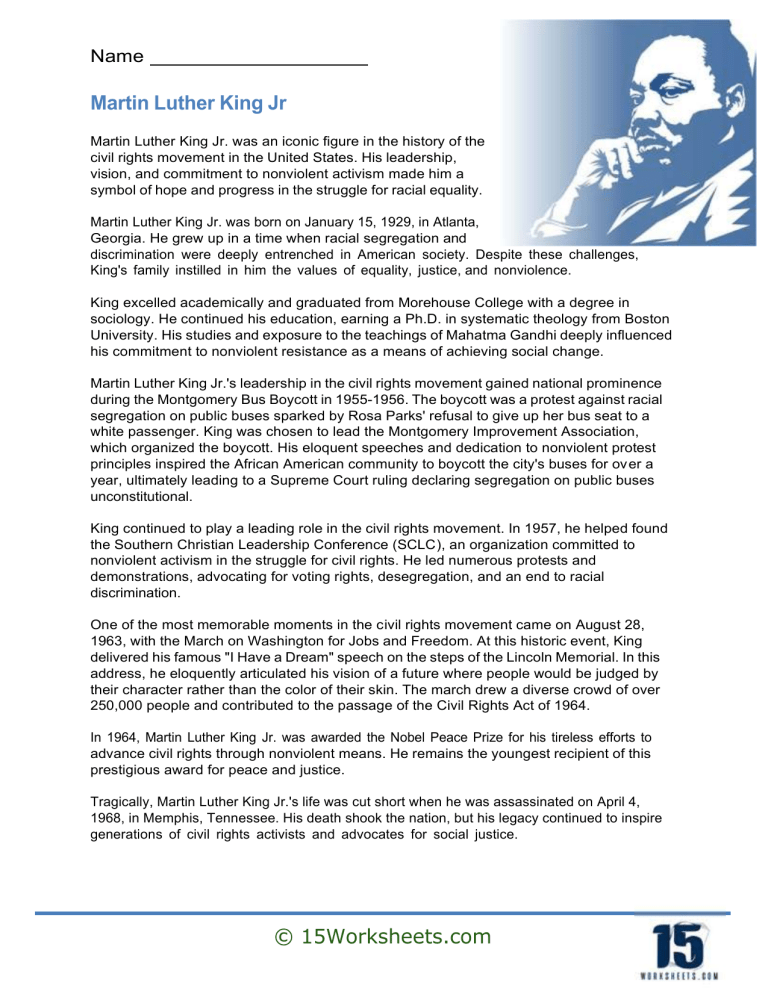
Name Martin Luther King Jr Martin Luther King Jr. was an iconic figure in the history of the civil rights movement in the United States. His leadership, vision, and commitment to nonviolent activism made him a symbol of hope and progress in the struggle for racial equality. Martin Luther King Jr. was born on January 15, 1929, in Atlanta, Georgia. He grew up in a time when racial segregation and discrimination were deeply entrenched in American society. Despite these challenges, King's family instilled in him the values of equality, justice, and nonviolence. King excelled academically and graduated from Morehouse College with a degree in sociology. He continued his education, earning a Ph.D. in systematic theology from Boston University. His studies and exposure to the teachings of Mahatma Gandhi deeply influenced his commitment to nonviolent resistance as a means of achieving social change. Martin Luther King Jr.'s leadership in the civil rights movement gained national prominence during the Montgomery Bus Boycott in 1955-1956. The boycott was a protest against racial segregation on public buses sparked by Rosa Parks' refusal to give up her bus seat to a white passenger. King was chosen to lead the Montgomery Improvement Association, which organized the boycott. His eloquent speeches and dedication to nonviolent protest principles inspired the African American community to boycott the city's buses for ov er a year, ultimately leading to a Supreme Court ruling declaring segregation on public buses unconstitutional. King continued to play a leading role in the civil rights movement. In 1957, he helped found the Southern Christian Leadership Conference (SCLC), an organization committed to nonviolent activism in the struggle for civil rights. He led numerous protests and demonstrations, advocating for voting rights, desegregation, and an end to racial discrimination. One of the most memorable moments in the civil rights movement came on August 28, 1963, with the March on Washington for Jobs and Freedom. At this historic event, King delivered his famous "I Have a Dream" speech on the steps of the Lincoln Memorial. In this address, he eloquently articulated his vision of a future where people would be judged by their character rather than the color of their skin. The march drew a diverse crowd of over 250,000 people and contributed to the passage of the Civil Rights Act of 1964. In 1964, Martin Luther King Jr. was awarded the Nobel Peace Prize for his tireless efforts to advance civil rights through nonviolent means. He remains the youngest recipient of this prestigious award for peace and justice. Tragically, Martin Luther King Jr.'s life was cut short when he was assassinated on April 4, 1968, in Memphis, Tennessee. His death shook the nation, but his legacy continued to inspire generations of civil rights activists and advocates for social justice. © 15Worksheets.com Name Martin Luther King Jr Comprehension Questions 1. Who was Martin Luther King Jr., and why is he significant in the context of the civil rights movement? a) Martin Luther King Jr. was a famous musician who played jazz music. b) Martin Luther King Jr. was a prominent civil rights leader and advocate for racial equality and justice. c) Martin Luther King Jr. was a renowned astronaut who went to space. d) Martin Luther King Jr. was a successful businessman who owned multiple companies. 2. What event led to Martin Luther King Jr.'s national prominence in the civil rights movement? a) b) c) d) The March on Washington The Montgomery Bus Boycott The passage of the Civil Rights Act of 1964 The Supreme Court ruling on segregation 3. What organization did Martin Luther King Jr. help found to promote nonviolent activism in the struggle for civil rights? a) b) c) d) The American Civil Liberties Union (ACLU) The Southern Christian Leadership Conference (SCLC) The National Association for the Advancement of Colored People (NAACP) The Black Panthers 4. What famous speech did Martin Luther King Jr. deliver during the March on Washington, and what was its message? a) "Give Me Liberty or Give Me Death," emphasizing the need for violent resistance. b) "We Shall Overcome," calling for unity among civil rights groups. c) "I Have a Dream," envisioning a future of racial equality and character-based judgments. d) "The Power of Nonviolence," advocating for aggressive protest methods. 5. What significant recognition did Martin Luther King Jr. receive in 1964, and why was it awarded to him? a) He received the Pulitzer Prize for his literary contributions. b) He received the Nobel Peace Prize for his dedication to advancing civil rights through nonviolent means. c) He received the Medal of Freedom for his military service. d) He received the Grammy Award for his music. © 15Worksheets.com
